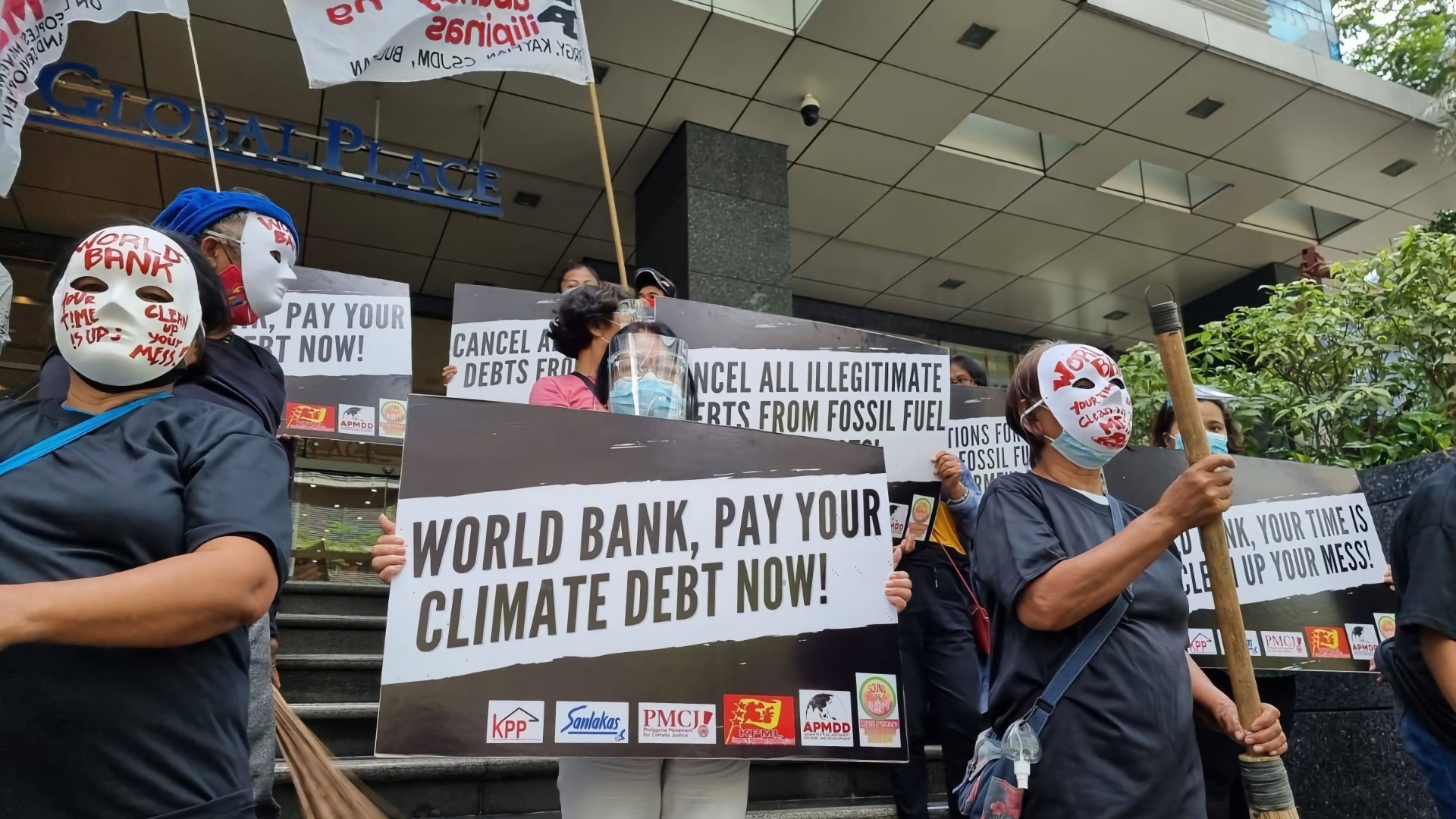

Climate campaigners in Asia led by the Asian Peoples’ Movement on Debt and Development (APMDD) called on the World Bank today to end its financing for coal, oil, and gas to combat climate change. APMDD Coordinator Lidy Nacpil said: “The World Bank’s time is up. It needs to stop financing fossil fuel projects. Asian countries have suffered and continue to suffer from the climate impacts of dirty projects financed by the World Bank.” The statement was made during a protest action in front of the World Bank office in BGC Taguig City.
Nacpil said public finance for carbon-intensive fossil fuel-based energy also burdened Global South countries with large debts and deepened inequalities amid the pandemic.
The 2021 Annual Meetings of the World Bank Group (WBG) and the International Monetary Fund (IMF) kicked off in Washington DC on Monday, October 11, and will wrap up on Sunday, October 17. The bank’s fossil fuel finance in the context of Covid-19 recovery and Climate Change Action Plan will be discussed.
According to APMDD, the bank’s main institutions for loans and development financing disbursed and committed $1.2 trillion worth of principal value of loans, equity, guarantees and grants from 1947 to 2020. One-third or $367 billion of funds disbursed or committed by the the International Bank for Reconstruction and Development (IBRD) and the International Development Association (IDA) went to energy projects of which $237 billion went to fossil fuel projects while $31 billion went to other harmful projects, such as large hydro dams and geothermal.
“The World Bank Group claims it is more committed than ever to helping countries meet their national climate targets, but it continues to pump public money into fossil fuels,” said Nacpil.
The Paris Agreement, adopted in 2015 by nearly 200 countries, includes the goal of keeping global average temperature rise to below 1.5 degrees Celsius from pre-industrial levels. The latest Report from the Intergovernmental Panel on Climate Change (IPCC) warns that temperature rise is already at an average of 1.09 degrees Celsius and the rate of warming is increasing. Scientists say meeting the Paris Agreement goal requires the world’s greenhouse emissions to drop to zero by 2050.
In 2013, the World Bank, the largest multilateral development bank, said it reduced its new coal power investments to “only in extremely rare circumstances.” In 2019 it announced that it will stop funding upstream oil and gas operations in 2019.
According to the World Bank’s new Climate Plan, the bank’s arm for private sector lending, the International Finance Corporation and Multilateral Investment Guarantee Agency will align 85% of their direct financing with the Paris Agreement by July 2023 and 100% by July 2025,
"While these shifts in the policies of the World Bank Group are important wins as a result of many years of campaigning by peoples’ movements and NGOs, we demand that the World Bank Group cease all involvement in fossil fuels. The world is running out of time,” Nacpil said.
Nacpil explained that the IBRD and IDA have invested a huge sum of $19.5 billion on fossil fuels (non-renewable energy generation, and oil and gas projects) even after the Paris Agreement. She said the figure could be even higher as IBRD-IDA jointly poured at least $30 billion in other energy and extractives projects since 2016.
“A number of these OE&E projects have portion of financing that will directly and/or indirectly support existing fossil fuel projects, such as the $400 million Pakistan Program for Affordable and Clean Energy project in which 17% is being allocated to non-renewable energy generation, and India’s Second Programmatic Electricity Distribution Reform DPL for Rajasthan where the WB’s $250 million financing may have benefited the majority of thermal-based generation in Rajasthan,” she explained.
“The World Bank continues to fuel global warming with its support for fossil fuels, and adding more to its climate debt which has already claimed millions of lives and caused social and ecological damages of astronomical scale,” said Nacpil.
“Now is the time for the World Bank to pay its climate debts and reparation for all the dirty and harmful projects that it has financed or supported in various ways. The bank should also cancel all illegitimate debts arising from fossil fuel and other harmful projects. Now is the time for the World Bank to pull out of all involvement in fossil fuels.”
